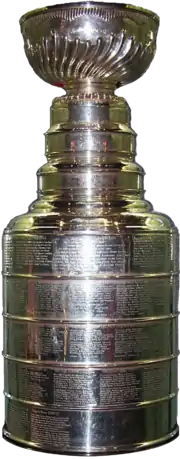List of Stanley Cup Finals officials
Before the Stanley Cup playoffs, a list of forty on-ice officials are named to work: Twenty referees and twenty linesmen. They are paired up in each round, traveling and working together between the series. Usually, they are never assigned to work two games between two teams they have already seen. This does not apply if a series reaches seven games, or at any point in time beginning in the third round. If a game seven is reached, those who have been assigned to work in the next round will call the series-deciding game. If at any time a referee or linesman is injured or unable to work, there is a standby official; he is there in the event that one of the officials cannot continue in the game.
Throughout the playoffs, the list of officials is minimized.
- During the second round, twenty-four officials (twelve referees and twelve linesmen) work games.
- During the third round, sixteen officials (eight referees and eight linesmen) work games.
In the final round of cuts, the list is reduced to ten officials: Five referees and five linesmen. They are named as Stanley Cup Finals officials. They are still in pairs, who will work every other game (even numbered and odd numbered). If the Stanley Cup Final reaches a game seven, the top four will be assigned to officiate the game; they may not have been paired during the finals.
2020
In 2020, the playoffs looked a little different. Referees and linesmen were placed in two separate bubbles for the qualifier round and the first two rounds (Toronto for the Eastern Conference and Edmonton for the Western Conference). The sixteen remaining officials would come together in Edmonton when there were four teams remaining in the playoffs.
As part of the NHLOA's recent collective bargaining agreement, 2020 was the first year they would name five referees and five linesmen to the Cup Final. Next to each official is the bubble in which they started the playoffs in.
|
Referees
|
Linesmen
|
2019
Before the 2019 Stanley Cup Finals, the NHL assigned five referees and four linesmen to the series:[1] Something they hadn't done since 2001. This was done, possibly because one of the referees (Wes McCauley) had sustained a leg injury during game six of the Western Conference Final and left the game. Even though he was named to work the Finals, he did not work in the seven-game series.
|
Referees
|
Linesmen
|
2002-2018
Beginning with the 2002 Stanley Cup Finals, the NHL assigned two referees and two linesmen for each game. A total of eight on-ice officials are named: Four referees and four linesmen.
2018 Stanley Cup Finals[2]
|
Referees
|
Linesmen
|
2017 Stanley Cup Finals
|
Referees
|
Linesmen
|
2016 Stanley Cup Finals[3]
|
Referees
|
Linesmen
|
2015 Stanley Cup Finals
|
Referees
|
Linesmen
|
2014 Stanley Cup Finals
|
Referees
|
Linesmen
|
2013 Stanley Cup Finals
|
Referees
|
Linesmen
|
2012 Stanley Cup Finals[4]
|
Referees
|
Linesmen
|
2011 Stanley Cup Finals
|
Referees
|
Linesmen
|
2010 Stanley Cup Finals
|
Referees
|
Linesmen
|
2009 Stanley Cup Finals
|
Referees
|
Linesmen
|
2008 Stanley Cup Finals
|
Referees
|
Linesmen
|
2007 Stanley Cup Finals
|
Referees
|
Linesmen
|
2006 Stanley Cup Finals
|
Referees
|
Linesmen
|
2004 Stanley Cup Finals
|
Referees
|
Linesmen
|
2003 Stanley Cup Finals
|
Referees
|
Linesmen
|
2002 Stanley Cup Finals
|
Referees
|
Linesmen
|
1999-2001
Between the 1999 and 2001 playoff seasons, the National Hockey League implemented a two referee, two linesman system. Five referees and four linesmen were named to work in the finals.
2001 Stanley Cup Finals
|
Referees
|
Linesmen
|
2000 Stanley Cup Finals
|
Referees
|
Linesmen
|
1999 Stanley Cup Finals
|
Referees
|
Linesmen
|
1979-1998
The National Hockey League used a single referee for each playoff game, with a rotation of three referees for the series. The referee with the highest regular-season performance rating was assigned games one, four, and seven; the second-highest rated referee was assigned games two and five; and the third-highest rated referee was assigned games three and six.
|
|
|
|
See also
References
- "2019 Stanley Cup Final Officials". NHL Officials Association. 22 May 2019. Retrieved 23 May 2019.
- "NHLOA NEWS - 2018 STANLEY CUP FINALS". NHL Officials Association. 27 May 2018. Retrieved 27 May 2018.
- "2016 STANLEY CUP FINALS OFFICIALS". National Hockey League Officials Association. 28 May 2016. Retrieved 25 August 2016.
- "STANLEY CUP FINALS OFFICIALS". National Hockey League Officials Association. Archived from the original on 15 May 2014. Retrieved 25 August 2016.
